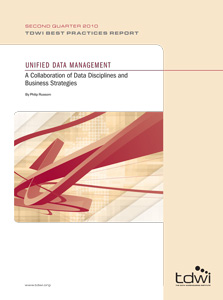
TDWI Best Practices Report | Unified Data Management: A Collaboration of Data Disciplines and Business Strategies
April 1, 2010
In most organizations today, data and other information are managed in isolated silos by independent teams using various data management tools for data quality, data integration, data governance and stewardship, metadata and master data management, B2B data exchange, content management, database administration and architecture, information lifecycle management, and so on. In response to this situation, some organizations are adopting what TDWI calls unified data management (UDM), a practice that holistically coordinates teams and integrates tools. Other common names for this practice include enterprise data management and enterprise information management. Regardless of what you call it, the “big picture” that results from bringing diverse data disciplines together yields several benefits, such as cross-system data standards, cross-tool architectures, cross-team design and development synergies, leveraging data as an organizational asset, and assuring data’s integrity and lineage as it travels across multiple organizations and technology platforms.
But unified data management isn’t purely an exercise in technology. Once it paves the way to managing data as an organizational asset, the ultimate goal of UDM becomes to achieve strategic, data-driven business objectives, such as fully informed operational excellence and business intelligence, plus related goals in governance, compliance, business transformation, and business integration. In fact, the challenge of UDM is to balance its two important goals—uniting multiple data management practices and aligning these with business goals that depend on data for success.
The purpose of this report is to help organizations plan and execute effective UDM efforts. Many need the help, because UDM is a relatively new shift in best practices for data management. Toward that end, the report drills into the business initiatives that need UDM, the data management practices and tools that support it, and the organizational structures that enable the cross-functional collaboration that’s critical to UDM success.